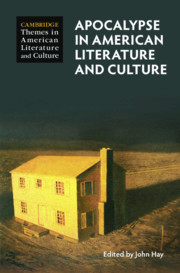Book contents
- Apocalypse in American Literature and Culture
- Cambridge Themes in American Literature and Culture
- Apocalypse in American Literature and Culture
- Copyright page
- Contents
- Figures
- Contributors
- Introduction The United States of Apocalypse
- Part I America as Apocalypse
- Part II American Apocalypse in (and out of) History
- Chapter 5 The Puritans Prepare for the Second Coming
- Chapter 6 The American Revolution as Extinction and Rebirth
- Chapter 7 Race, American Enlightenment, and the End Times
- Chapter 8 Sentimental Premonitions and Antebellum Spectacle
- Chapter 9 Antebellum Anticipations of Annihilation
- Chapter 10 The Apocalyptic Fury of the Civil War
- Chapter 11 Apocalyptic Form in the American Fin de Siècle
- Chapter 12 The Ruins of American Modernism
- Chapter 13 Mutually Assured Destruction in Cold War/Postwar America
- Chapter 14 Postmodern American Literature at the End of History
- Chapter 15 Ecology, Ethics, and the Apocalyptic Lyric in Recent American Poetry
- Chapter 16 Disaster Response in Post-2000 American Apocalyptic Fiction
- Part III Varieties of Apocalyptic Experience
- Further Reading
- Index
Chapter 14 - Postmodern American Literature at the End of History
from Part II - American Apocalypse in (and out of) History
Published online by Cambridge University Press: 03 December 2020
- Apocalypse in American Literature and Culture
- Cambridge Themes in American Literature and Culture
- Apocalypse in American Literature and Culture
- Copyright page
- Contents
- Figures
- Contributors
- Introduction The United States of Apocalypse
- Part I America as Apocalypse
- Part II American Apocalypse in (and out of) History
- Chapter 5 The Puritans Prepare for the Second Coming
- Chapter 6 The American Revolution as Extinction and Rebirth
- Chapter 7 Race, American Enlightenment, and the End Times
- Chapter 8 Sentimental Premonitions and Antebellum Spectacle
- Chapter 9 Antebellum Anticipations of Annihilation
- Chapter 10 The Apocalyptic Fury of the Civil War
- Chapter 11 Apocalyptic Form in the American Fin de Siècle
- Chapter 12 The Ruins of American Modernism
- Chapter 13 Mutually Assured Destruction in Cold War/Postwar America
- Chapter 14 Postmodern American Literature at the End of History
- Chapter 15 Ecology, Ethics, and the Apocalyptic Lyric in Recent American Poetry
- Chapter 16 Disaster Response in Post-2000 American Apocalyptic Fiction
- Part III Varieties of Apocalyptic Experience
- Further Reading
- Index
Summary
When Francis Fukuyama announced “the end of history” as the Cold War ended, he suggested that the teleology of historical progression had passed and that Western-style liberal democracy had prevailed. Postmodern American novelists, however, have portrayed not history’s end but its rebirth as a form of interrogation and reinvention. Recognizing that new technologies for instant representation (radio, television, the internet) have altered both our sense of history and the practice of history, postmodern writers treat history as something happening and being created in the present moment. Like currency, history becomes fungible. Consequently, received versions of history no longer have the same power. They are subject to exchange. It is not precisely that history has always been lies but rather fictions in which people may choose to believe. Writers such as Toni Morrison or Joan Didion write alternative versions of history that critique received exceptionalist, racist American ones. On the other hand, in the era of climate change, the “end of history” has taken on an apocalyptic valence as writers such as Don DeLillo, Cormac McCarthy, and Kurt Vonnegut portray the end of history as the beginning of the Anthropocene era: truly the end of history.
Keywords
- Type
- Chapter
- Information
- Apocalypse in American Literature and Culture , pp. 187 - 198Publisher: Cambridge University PressPrint publication year: 2020



